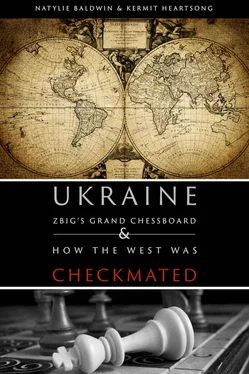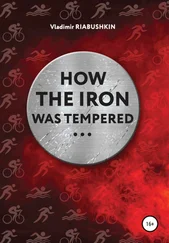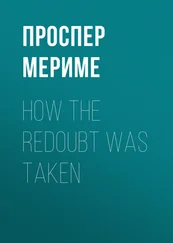Kermit Heartsong - Ukraine - ZBIG's Grand Chess Board & How The West Was Checkmated
Здесь есть возможность читать онлайн «Kermit Heartsong - Ukraine - ZBIG's Grand Chess Board & How The West Was Checkmated» весь текст электронной книги совершенно бесплатно (целиком полную версию без сокращений). В некоторых случаях можно слушать аудио, скачать через торрент в формате fb2 и присутствует краткое содержание. Год выпуска: 2015, Жанр: Политика, на английском языке. Описание произведения, (предисловие) а так же отзывы посетителей доступны на портале библиотеки ЛибКат.
- Название:Ukraine: ZBIG's Grand Chess Board & How The West Was Checkmated
- Автор:
- Жанр:
- Год:2015
- ISBN:нет данных
- Рейтинг книги:4 / 5. Голосов: 1
-
Избранное:Добавить в избранное
- Отзывы:
-
Ваша оценка:
- 80
- 1
- 2
- 3
- 4
- 5
Ukraine: ZBIG's Grand Chess Board & How The West Was Checkmated: краткое содержание, описание и аннотация
Предлагаем к чтению аннотацию, описание, краткое содержание или предисловие (зависит от того, что написал сам автор книги «Ukraine: ZBIG's Grand Chess Board & How The West Was Checkmated»). Если вы не нашли необходимую информацию о книге — напишите в комментариях, мы постараемся отыскать её.
Ukraine: ZBIG's Grand Chess Board & How The West Was Checkmated — читать онлайн бесплатно полную книгу (весь текст) целиком
Ниже представлен текст книги, разбитый по страницам. Система сохранения места последней прочитанной страницы, позволяет с удобством читать онлайн бесплатно книгу «Ukraine: ZBIG's Grand Chess Board & How The West Was Checkmated», без необходимости каждый раз заново искать на чём Вы остановились. Поставьте закладку, и сможете в любой момент перейти на страницу, на которой закончили чтение.
Интервал:
Закладка:
Brzeziński, who is a busy bee, followed this up with an interview with CNN’s Fareed Zakaria in which he stated, “I would say that we’re not starting the Cold War. He [Putin] has started it.” He once again reiterated the false narrative that the Ukraine crisis came about at Russia’s instigation and shrieked about Russian imperial ambitions, “What is the alternative? To let war break out in Europe? To let Russia go on to the Baltic states from Ukraine? To let such acts simply be ignored? Is that the choice? Is that the test of leadership?” (Zakaria 2014)
Either Brzeziński is incredibly ill-informed (which is not very plausible) or he is lying on behalf of his own anti-Russia agenda.
Furthermore, his talking points on the Ukraine crisis are almost identical to his talking points to the media about the war between Russia and Georgia in 2008. For example, Brzeziński said the following during an interview with Huffington Post ’s Nathan Gardels during the height of hostilities between those two nations:
The question the international community now confronts is how to respond to a Russia that engages in the blatant use of force with larger imperial designs in mind: to reintegrate the former Soviet space under the Kremlin’s control and to cut Western access to the Caspian Sea and Central Asia by gaining control over the Baku-Ceyhan pipeline that runs through Georgia. (Gardels 2008)
Brzeziński also made sure to compare Putin to both Hitler and Stalin, comparing the Russian “invasion” of Georgia to Hitler’s invasion of the Sudetenland and to Stalin’s attack on Finland. Apparently, Brzeziński failed to realize that Dmitry Medvedev was the Russian president and commander-in-chief at that time and there is no dispute that he gave the military orders while Prime Minister Putin was at the Olympics in Beijing.
So, how does Brzeziński’s hysteria-laced analysis of the Russian-Georgian conflict hold up to the facts?
According to the EU’s “Independent International Fact-Finding Mission on the Conflict in Georgia” issued in September 2009, it was the Georgian armed forces that initiated the conflict, not Russia (EU Report). Georgia’s president at the time, Mikheil Saakashvili, was a Western-backed leader who, based on the observations of several world leaders and diplomats, exhibited behavior that indicated he may have been psychologically unbalanced. Saakashvili was apparently operating under the delusion that he could militarily take on Russia and that the US had his back (Roxburgh 2013; European Union; Armstrong 2009).
As for wanting to seize control of the Baku-Ceyhan pipeline, the Russians could have done that easily in the midst of the armed conflict in Georgia, but made no attempt to do so.
So, Brzeziński was either woefully misinformed about that conflict or he was lying on behalf of his anti-Russia agenda then, too. It is troubling that in light of either incompetence or mendacity, he is still being given credibility to comment on the current conflict by mainstream media outlets and the US Congress as well as being invited to the White House for a meeting with the president in early September as a foreign policy “expert” (Landler 2014).
And, with respect to his oft-repeated claim that Putin is an incipient Hitler or Stalin, in the intervening five-and-a-half years between the Georgia conflict and the Ukraine crisis, Russia has not engaged in or threatened any military conflicts with its neighbors. As Russia expert Thomas Graham writes:
Russian territorial ambitions beyond its traditional geopolitical zone have been quite limited historically. In this regard, the Soviet period stands out as an anomaly, born of the unique conditions of the mid to late twentieth century: the power vacuum in the center of Europe created by the total collapse of Nazi Germany and the subsequent bitter ideological divide and revolutionary upheaval that produced a global competition between the Soviet Union and the United States. Those conditions no longer prevail, and Russia has reverted to its historical policy of creating a suitable balance of power on the European continent that takes into account the interests of the other great European powers. (Graham 2014)
Brzeziński never misses an opportunity to accuse Putin of being an imperialist and wanting to revive the Soviet Union — an accusation that is dutifully repeated by other demagogues like John McCain, Hillary Clinton, and Marco Rubio. This accusation is largely based upon a sentence plucked out of a 2005 speech given by Putin and used as Exhibit A of his imperial ambitions. Let’s take a look at what Putin actually said:
Above all, we should acknowledge that the collapse of the Soviet Union was a major geopolitical disaster of the century. As for the Russian nation, it became a genuine tragedy. Tens of millions of our co-citizens and compatriots found themselves outside Russia’s territory. Moreover, the epidemic of disintegration infected Russia itself.
Individual savings were devalued, and old ideals destroyed. Many institutions were disbanded or reformed carelessly. Terrorist intervention and the Khasavyurt capitulation that followed damaged the country's integrity. Oligarchic groups — possessing absolute control over mass media — served exclusively their own corporate interests. Mass poverty began to be seen as the norm. And all this was happening against the backdrop of a dramatic economic downturn, unstable finances, and the paralysis of the social sphere.
Many thought or seemed to think at the time that our young democracy was not a continuation of Russian statehood, but its ultimate collapse, the prolonged agony of the Soviet system.
But they were mistaken.
That was precisely the period when the significant developments took place in Russia. Our society was generating not only the energy of self-preservation, but also the will for a new and free life. In those difficult years, the people of Russia had to both uphold their state sovereignty and make an unerring choice in selecting a new vector of development in the thousand years of their history. They had to accomplish the most difficult task: how to safeguard their own values, not to squander undeniable achievements, and confirm the viability of Russian democracy. We had to find our own path in order to build a democratic, free, and just society and state.
When speaking of justice, I am not of course referring to the notorious “take away and divide by all” formula, but extensive and equal opportunities for everybody to develop.
Success for everyone. A better life for all.
— Vladimir Putin, Annual Address to the Federal Assembly of the Russian Federation, April 25, 2005
This excerpt of Putin’s speech — correctly translated and in context — where he is discussing the conditions of Post-Soviet Russia in the 1990s (which we will explore in detail in Chapter 4) speaks for itself and shows the willingness of Western politicians and pundits to perpetuate misinformation on behalf of an agenda.
It is clear that Brzeziński’s psyche is frozen in another era when his fellow Poles were under subjugation from the Soviet Union. This kind of anachronistic and narrow thinking, based on the unresolved emotional wounds of one small segment of the American population who are émigrés or descended from émigrés of former Soviet bloc countries, along with a preoccupation with imperialism, is dangerous if it overtakes US foreign policy, which it appears to have done considering Brzeziński’s influence in Washington.
The real issue is whether there will be a multi-polar world or whether the US will insist on continuing its role as the lone hegemon, which will necessitate resorting to more desperate and more brutal measures to maintain. Brzeziński comes out firmly in favor of the latter.
Читать дальшеИнтервал:
Закладка:
Похожие книги на «Ukraine: ZBIG's Grand Chess Board & How The West Was Checkmated»
Представляем Вашему вниманию похожие книги на «Ukraine: ZBIG's Grand Chess Board & How The West Was Checkmated» списком для выбора. Мы отобрали схожую по названию и смыслу литературу в надежде предоставить читателям больше вариантов отыскать новые, интересные, ещё непрочитанные произведения.
Обсуждение, отзывы о книге «Ukraine: ZBIG's Grand Chess Board & How The West Was Checkmated» и просто собственные мнения читателей. Оставьте ваши комментарии, напишите, что Вы думаете о произведении, его смысле или главных героях. Укажите что конкретно понравилось, а что нет, и почему Вы так считаете.











